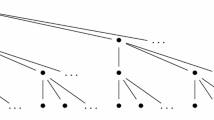Abstract
This paper provides a logic framework for investigations of game theoretical problems. We adopt an infinitary extension of classical predicate logic as the base logic of the framework. The reason for an infinitary extension is to express the common knowledge concept explicitly. Depending upon the choice of axioms on the knowledge operators, there is a hierarchy of logics. The limit case is an infinitary predicate extension of modal propositional logic KD4, and is of special interest in applications. In Part I, we develop the basic framework, and show some applications: an epistemic axiomatization of Nash equilibrium and formal undecidability on the playability of a game. To show the formal undecidability, we use a term existence theorem, which will be proved in Part II.
Similar content being viewed by others
References
Aumann, R. J., (1993), Backward Induction and Common Knowledge of Rationality, Mimeo.
Bacharach, M., (1987), ‘A Theory of Rational Decision in Games’, Erkenntnis 27, 17–55.
Bacharach, M., (1994), ‘The Epistemic Structure of a Theory of a Game’, Theory and Decision 37, 7–48.
Balkenborg, D., and E. Winter, (1995), A Necessary and Sufficient Condition for Playing Backward Induction, Mimeo.
Bubelis, V., (1979), ‘On Equilibria in Finite Games’, International Journal of Game Theory 8, 65–79.
Halpern, J. H., and Y. Moses, (1992), ‘A Guide to Completeness and Complexity for Modal Logics of Knowledge and Beliefs’, Artificial Intelligence 54, 319–379.
Herstein, I. N., and J. Milnor, (1953), ‘An Axiomatic Approach to Measurable Utility’, Econometrica 21, 291–297.
Hintikka, J., (1962), Knowledge and Belief, Cornell University Press.
Kaneko, M., (1996a), Epistemic Considerations of Nash Equilibrium. Forthcoming.
Kaneko, M., (1996b), Mere and Specific Knowledge of the Existence of a Nash Equilibrium. Forthcoming.
Kaneko, M., and T. Nagashima, (1991), ‘Final Decisions, Nash Equilibrium and Solvability in Games with the Common Knowledge of Logical Abilities’, Mathematical Social Sciences 22, 229–255.
Kaneko, M., and T. Nagashima, (1994), ‘Axiomatic Indefinability of Common Knowledge in Finitary Logics’, To appear in Epistemic Logic and the Theory of Games and Decision, eds. M. Bacharach, L. A. Gerard-Varet, P. Mongin and H. Shin.
Karp, C., (1964), Languages with Expressions of Infinite Length, North-Holland.
Keisler, H. J., (1971), Model Theory for Infinitary Logic, North-Holland.
Lemke, C. E., and J. T. Howson, (1964), ‘Equilibrium Points of Bimatrix Games’, SIAM Journal of Applied Mathematics 12, 412–423.
Lismont, L., and P. Mongin, (1994), ‘On the Logic of Common Belief and Common Knowledge’, Theory and Decision 37, 75–106.
Luce, R. D., and H. Raiffa, (1957), Games and Decisions, John Wiley Sons, Inc.
Mendelson, E., (1973), Number Systems and the Foundations of Analysis, Academic Press.
Mendelson, E., (1987), Introduction to Mathematical Logic, Wadsworth.
Nash, J. F., (1951), ‘Noncooperative Games’, Annals of Mathematics 54, 286–295.
Rabin, M., (1977), ‘Decidable Theories’, Handbook of Mathematical Logic, ed. J. Barwise, 595–630.
Segerberg, K., (1994), ‘A Model Existence Theorem in Infinitary Propositional Modal Logic’, Journal of Philosophical Logic 23, 337–367.
von Neumann, J., (1928), ‘Zur Theorie der Gesellschaftsspiele’, Mathematische Annalen 100, 295–320.
von Neumann, J., (1937), ‘Über ein ökonomisches Gleichungssystem und eine Verallgemeinerung des Brouwerschen Fixpunktsatzes’, Ergebrnisse eines Mathematischen Kolloquiums 8, 73–83. English translation, ‘A Model of General Economic Equilibrium’, Review of Economic Studies 13 (1945), 1–9.
von Neumann, J., and O. Morgenstern, (1944), Theory of Games and Economic Behavior, Princeton University Press.
Author information
Authors and Affiliations
Additional information
The authors thank Hiroakira Ono for helpful discussions and encouragements from the early stage of this research project, and Philippe Mongin, Mitio Takano and a referee of this journal for comments on earlier versions of this paper. The first and second authors are partially supported, respectively, by Tokyo Center of Economic Research and Grant-in-Aids for Scientific Research 04640215, Ministry of Education, Science and Culture.
Rights and permissions
About this article
Cite this article
Kaneko, M., Nagashima, T. Game logic and its applications I. Stud Logica 57, 325–354 (1996). https://doi.org/10.1007/BF00370838
Received:
Revised:
Issue Date:
DOI: https://doi.org/10.1007/BF00370838




